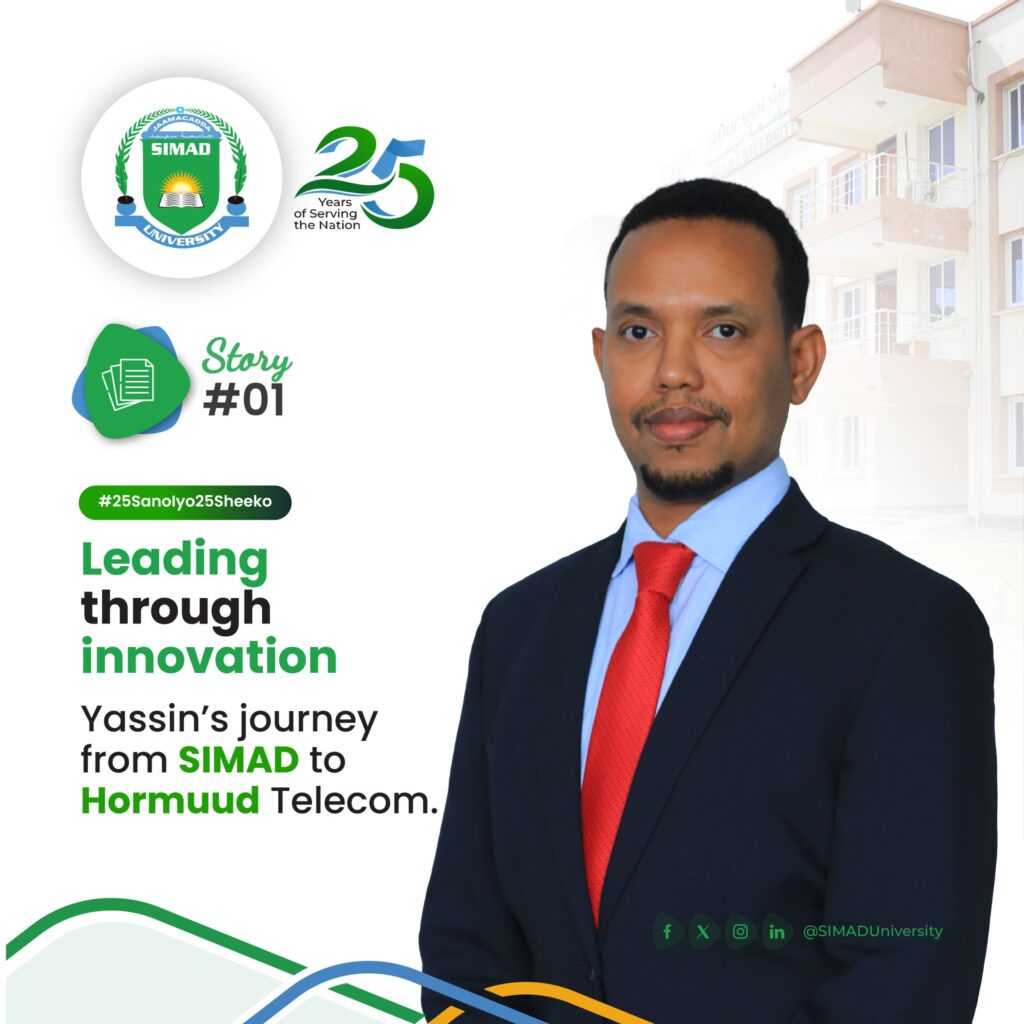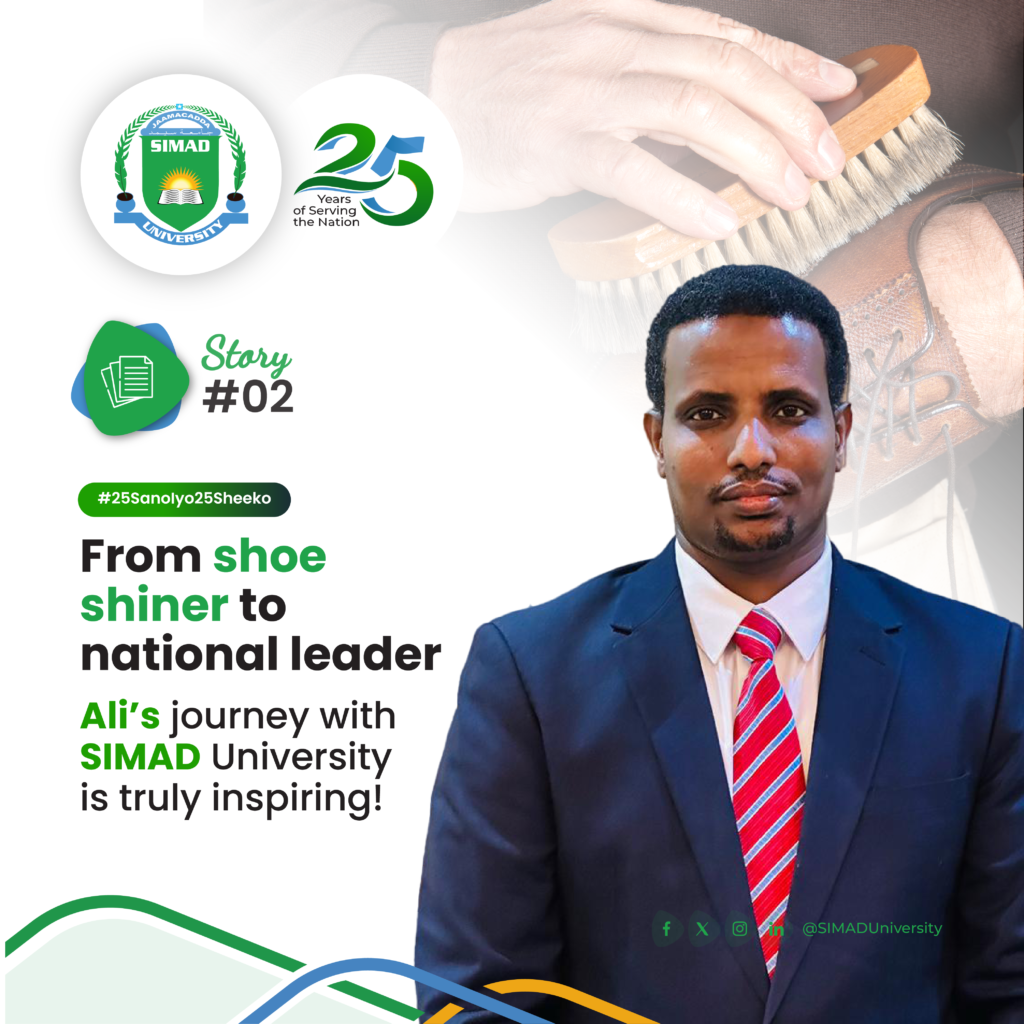Mohamed Hussein, a Special Adviser to the Minister of Education, reflects on the deep connection he and his family hold with SIMAD University. Both he and his wife are alumni, having graduated from the institution that would shape their careers and life’s work. Mohamed attended SIMAD from 2005 to 2009, obtaining a bachelor’s degree in business administration. Driven to advance his academic career, he later pursued a postgraduate diploma in project management from Cambridge Institutional Managers and a master’s degree in strategic management from Kenyatta University in Nairobi. Now in the final stages of his PhD in strategic management, he is on the cusp of earning the title “Dr.,” a fitting milestone in his distinguished journey.
After completing his studies at SIMAD, Mohamed joined the humanitarian development sector, starting with the Norwegian Refugee Council (NRC) in Somalia. Beginning as a junior officer, he rapidly rose to management roles. His twelve-year tenure with NRC took him to various countries, including Ethiopia, Djibouti, Tanzania, South Sudan, and Uganda, each experience broadening his expertise in leadership. His last role with the organization was as the Country Director for Uganda, a position that extended his leadership across Tanzania and Djibouti as well. In 2018, he returned to Somalia, taking on a pivotal role as the Director of the Aid Coordination Unit in the Office of the Prime Minister. Here, Mohamed acted as the vital link between the government and donors, fostering development cooperation, aid coordination, and the implementation of Somalia’s national development plan. After holding this role until 2021, he collaborated with the World Bank on consultancy projects before rejoining the government as a senior and principal adviser to the Minister of Education.
For Mohamed, SIMAD University holds an irreplaceable place in his life. He remembers the resilience of the institution during his student days when the university faced many challenges amid Somalia’s conflict. Despite these hurdles, SIMAD remained steadfast, relocating as necessary to ensure students could complete their studies without interruption. This unwavering commitment instilled in him a lasting respect for the institution. He recognizes SIMAD’s profound impact on human development and the reconstruction of Somalia, viewing it as a critical force that has shaped generations of skilled professionals who are now contributing to various sectors.
The collapse of Somalia’s central government resulted in widespread loss—of knowledge, human capital, and work ethics. In this void, SIMAD emerged as a powerful institution, producing graduates equipped to address the country’s most pressing needs. Its focus on curriculum quality, language development, and attracting experienced lecturers has elevated educational standards and produced professionals ready to make a positive impact across governance, finance, entrepreneurship, and the public sector. As Mohamed sees it, SIMAD’s influence is visible throughout these fields, enhancing Somalia’s development.
Through the university’s dynamic alumni network, which Mohamed values deeply, SIMAD graduates across diverse industries remain connected. Regular gatherings during occasions such as Ramadan and Eid foster these bonds, while the university’s Public Relations team and alumni network actively maintain the community. Mohamed notes that this network, and the opportunities it offers for professional and personal growth, is part of what makes SIMAD truly special. SIMAD’s alumni consistently make strides in their respective sectors, creating a shared professional legacy that strengthens the institution’s impact on the nation.
SIMAD’s evolution from a small institution offering business and IT programs to a comprehensive university with numerous faculties reflects the institution’s forward-looking approach to education and development. Today, SIMAD houses an Incubation Lab to promote entrepreneurship and the Institute for Climate Change and Environment, both critical for Somalia’s recovery and sustainable growth. Mohamed, having witnessed this expansion firsthand, envisions a future in which SIMAD will play an even larger role in shaping Somalia’s future human capital landscape through research, policy influence, and governance improvements.
For Mohamed and his family, SIMAD’s legacy is personal as well as professional. His wife, an alumna who studied accounting and once worked in the university’s examination department, shares this sense of pride and connection. Together, they observe the growth of the institution that has woven itself into their lives, memories, and future aspirations. Mohamed also highlights the unique role SIMAD plays within the Somali higher education landscape, distinguishing itself as a leader in research and policy, and addressing societal issues like climate change. In his view, SIMAD is becoming a generational institution, one that stands out among the growing number of universities in Somalia by providing the high-quality education needed to build a robust future for the country.
Reflecting on SIMAD’s impact, Mohamed notes that many of Somalia’s current leaders, including the nation’s president—who was once his dean—are SIMAD alumni. Others have served in the cabinet or parliament, while many have succeeded in international arenas, showcasing the institution’s ability to produce highly competitive professionals. Mohamed’s own career exemplifies this legacy, as he continues to play an influential role in Somalia’s education sector and government. With SIMAD’s continued growth, dedication to quality, and commitment to forward-thinking leadership, Mohamed believes that the university’s future remains bright, with a vast potential to drive both the micro and macroeconomic progress needed to rebuild Somalia.


